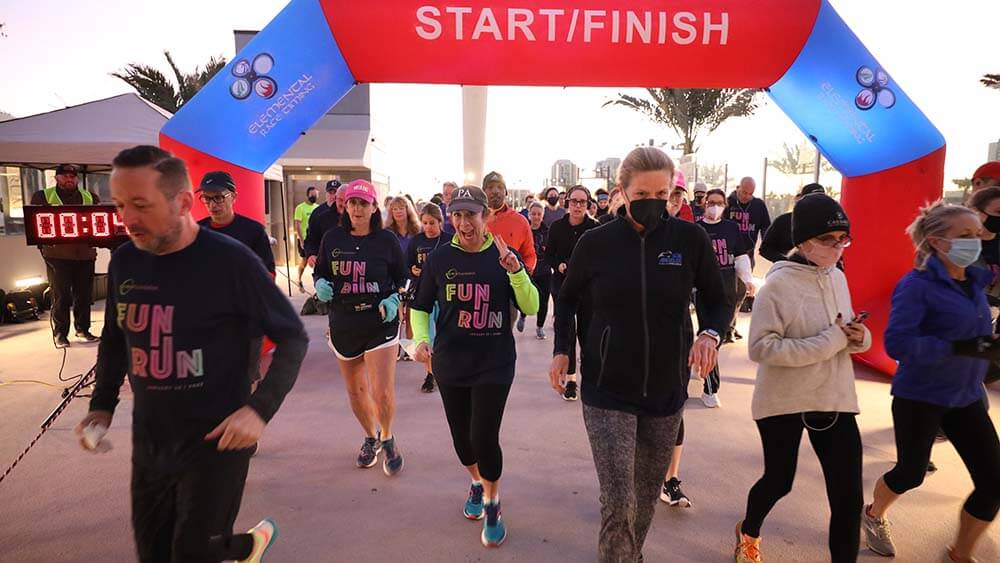
Attendees at PCMA Convening Leaders 2022 in Las Vegas take part in the fun run. Many respondents to our April Recovery Dashboard survey said they deal with stress through physical activities like running, yoga, and walking. (Jacob Slaton Photography)
We’ve been following the changing moods of planners and suppliers throughout the pandemic — from when vaccinations were first on the horizon and then well distributed to the surges of two contagious COVID variants — in our monthly and bimonthly COVID-19 Recovery Dashboard surveys. We’ve checked in on the collective industry’s state of mind by asking one question: How are you feeling?
In past surveys, we’ve given respondents free rein to check off all the emotions they are experiencing, from feeling hopeful to experiencing burnout, knowing that we can have different and sometimes conflicting feelings at the same time. In April, we asked respondents — 399 planners and 181 suppliers — to pick just one option that best describes what they were feeling in the moment. If they checked off “anxious about the future” or “exhausted and burned out,” they were automatically directed to additional questions about their mental health.
3 Things to Know
- More than 1/3 of planners and 3 out of 10 suppliers say they are anxious or burned out.
- Work/life balance is the biggest source of burnout for planners and suppliers alike.
- Four out of 10 planners said they have added content related to workplace mental health and work/life balance to their educational program and have changed the design of their in-person event to add more wellness elements.
Feeling the Burn
Our results indicate that planners seem to have a bit more angst than suppliers. More than one-third of planners said they were either anxious about the future or feeling exhausted and burned out; 31 percent of suppliers said the same. When asked to describe their symptoms of burnout (as defined by the World Health Organization), 83 percent of suppliers said their energy was depleted or they felt exhausted; 62 percent said they were mentally distancing themselves from their job; and 45 percent said their efficacy had been reduced. For planners, the symptoms were more pronounced: 88 percent felt exhausted; 78 percent said they were feeling negative about their job; and nearly half said they were less efficient.
As far as what is contributing to their burnout, three out of four planners said it was work/life balance. This is a profession that has traditionally required long hours and travel, but remote work — which makes establishing boundaries between work and personal lives more challenging — likely exacerbated that. And pandemic uncertainties, being short-staffed, and working with suppliers that are short-staffed not only contribute to stress levels but increase the workload.
Work/life balance is also the most- cited source of burnout among suppliers, but fewer than seven out of 10 clicked that option. For suppliers, external events — from the war in Ukraine to supply-chain issues — were the second-largest single source of stress.
Attending to Attendee Wellness
Recognizing how the pandemic has changed how their stakeholders prioritize wellness, two out of five planners said they have added content related to workplace mental health and work/life balance to their educational program. An equal number have changed the design of their in-person event — the most common tweaks are more networking and activity/movement opportunities, followed by healthier F&B options and more white space.
Workplace Support
Around two out of five planners and suppliers were offered mental-health support initiatives by their employer during the pandemic, ranging from coaching with an HR specialist and free counseling to access to meditation apps and wellness days off. “We had a few Zoom meetings about grief management, and a Zoom about self-care,” one planner respondent shared. “I wouldn’t rate these efforts high on a scale of efficacy.” Another planner said that a mini- mum is offered in the way of workplace mental health support options and almost “frowned upon” if accessed.
Dealing With — or Making — Changes
Two out of five planners and more than half of supplier respondents said their role had changed as a result of pandemic-related furloughs or staff reductions and around one-quarter of both planners and suppliers said they have made a personal decision to change their role. And in a stark reminder that we have all experienced the pandemic in different life-changing ways, one supplier made the decision not to seek new job opportunities after losing a spouse to COVID.
One planner who was laid off from a well-loved job is now back to planning meetings at a different organization and with a changed mindset: “I am now more mindful of not dedicating every waking moment to my job. I don’t get worked up about items that once bothered me. I know now that everything can change in an instant….”
Michelle Russell is editor in chief of Convene.
Please download a PDF of the April Recovery Dashboard—Mental Health results by clicking the link below. Find results from the rest of the April Dashboard here.
RELATED: What Planners and Suppliers Are Saying About Mental Wellness
Previous Recovery Dashboard Results
Find all the past results on our Recovery Dashboard archive page.
